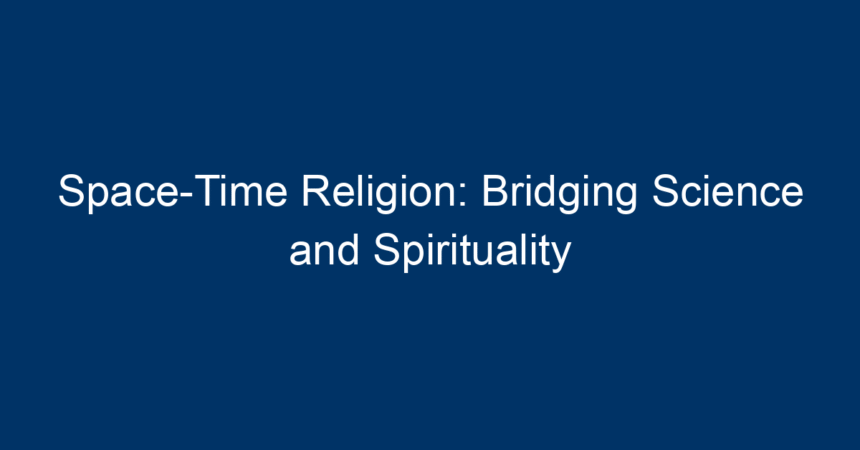Introduction
In an age where scientific discoveries continuously reshape our understanding of the universe, the intersection of science and spirituality invites intriguing discussions. One of the most compelling frameworks emerging from this confluence is "space-time religion." This concept seeks to bridge the often disparate realms of scientific inquiry and spiritual belief, offering a unified perspective on existence, consciousness, and the cosmos. As we delve into this fascinating territory, we’ll explore its implications, principles, and how it can provide a deeper understanding of our place in the universe.
Understanding Space-Time Religion
Defining the Concept
At its core, space-time religion intertwines the principles of physics—particularly the theory of relativity—with spiritual beliefs. This emerging ideology suggests that time and space are not merely physical realities but also hold deep metaphysical significance. By acknowledging the interconnectedness of all things through space-time, believers can find common ground between scientific thought and spiritual practice.
Historical Context
The roots of space-time religion can be traced back to ancient philosophies. Thinkers like Plato and Aristotle pondered the nature of existence, time, and the universe. However, with the advent of the scientific revolution in the 17th century, these discussions took on new meanings. Einstein’s theory of relativity shifted our understanding of time and space, gradually paving the way for contemporary discussions of a space-time religion that incorporates both scientific principles and spiritual insights.
The Science Behind Space-Time
The Theory of Relativity
Albert Einstein’s theory of relativity revolutionized our understanding of the universe. It introduced the idea that time and space are interwoven into a single continuum known as space-time. This relationship suggests that time is relative, influenced by speed and gravitational pull. For space-time religion, this means that our perception of reality is dynamic—offering a spiritual reflection that we are interconnected with the universe.
Quantum Mechanics and Consciousness
Quantum mechanics further complicates our understanding of reality. It introduces the concept of entanglement, a phenomenon where particles become interlinked, affecting each other regardless of distance. This idea resonates with many spiritual traditions that emphasize the interconnectedness of all beings. In this context, space-time religion posits that consciousness transcends individual existence, suggesting a shared, collective spiritual journey.
Bridging the Gap: Science Meets Spirituality
Common Ground
Space-time religion presents an opportunity for dialogue between scientists and spiritual leaders. Both realms grapple with profound questions about existence and purpose. By recognizing the validity of each perspective, we can foster a better understanding of reality. Science helps elucidate the mechanisms of the universe, while spirituality addresses the meaning behind our existence.
The Role of Meditation and Mindfulness
Practices such as meditation and mindfulness can serve as bridges between science and spirituality. Studies have shown that these practices can positively affect brain function, emotional well-being, and overall health. In the context of space-time religion, these practices can deepen our understanding of consciousness, illustrating how our internal experiences relate to the vastness of the universe.
The Implications of Space-Time Religion
Enhancing Personal Meaning
By integrating space-time religion into our lives, we can cultivate a deeper sense of purpose. Understanding our existence as part of a greater cosmos allows us to ponder life’s meaning more profoundly. This perspective encourages introspection and self-discovery, enabling personal growth and fulfillment.
Ethical Considerations
Space-time religion also raises important ethical questions. If we are all interconnected within this space-time continuum, our actions have broader implications. This interconnectedness fosters a sense of responsibility toward each other and the planet. It underscores the importance of compassion, empathy, and ethical decision-making in our interactions.
Challenges to Space-Time Religion
Skepticism from Traditional Views
Despite its potential, space-time religion faces skepticism from both scientific and religious communities. Traditionalists in these fields may resist the blending of empirical science with spiritual beliefs. Overcoming this skepticism will require open-minded discussions and a willingness to embrace the unknown.
Fear of the Unknown
As we explore the uncharted territories of space-time religion, fear of the unknown can be a significant barrier. The complexities of the universe can be daunting, and individuals may hesitate to confront ideas that challenge their existing beliefs. Embracing curiosity and a willingness to learn can help navigate these fears.
Actionable Insights for Embracing Space-Time Religion
Cultivating Awareness
Begin by observing the interconnectedness of life around you. Reflect on how your actions impact others and the environment. This awareness can help foster a sense of belonging within the larger cosmos, enriching your spiritual practice.
Engage in Mindful Practices
Incorporate meditation or mindfulness into your daily routine. These practices can help you align your thoughts with the principles of space-time religion, promoting inner peace and expanded consciousness.
Explore Scientific Concepts
Delve into the principles of relativity and quantum mechanics through readings or discussions. Understanding these scientific concepts can enhance your appreciation for the cosmos and its spiritual implications.
Foster Open Dialogues
Engage in discussions with those who hold different perspectives on science and spirituality. Promote dialogue that encourages curiosity, understanding, and collaborative exploration of space-time religion.
Conclusion
Space-time religion serves as a profound intersection of science and spirituality, inviting us to rethink our relationship with the universe. By embracing its principles, we can gain deeper insights into ourselves and the cosmos. Through mindfulness, curiosity, and open dialogue, we can bridge the gap between scientific inquiry and spiritual exploration—creating a more harmonious understanding of our existence. As we continue to navigate the complexities of life, let us remain open to the possibilities that lie at the crossroads of space-time and religion, enriching our journey through this magnificent universe.




